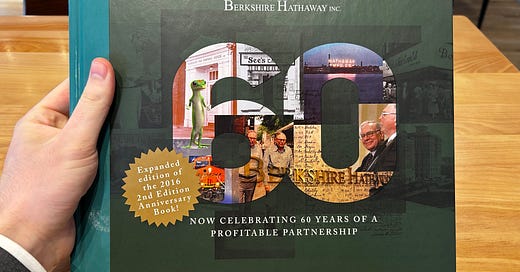
Two milestones came and went over the last 48 hours.
I turned 28
I published the 100th edition of my financial newsletter
To be clear, coordinating for those events to fall on the same date was not planned when my co-founder and I first launched our media startup in April. I don’t believe in voodoo or the paranormal, but I do subscribe to the belief that the universe is rarely lazy enough to allow for coincidence.
So as it happens, I’m entering a pivotal final two years of my twenties at the same time my business turns a corner. I’ll take that as a good omen.
One year ago, I published a list of lessons on my birthday that became my second most-read piece of the last six years. In it, I wrote how the beauty of every birthday is that you become that much better at making decisions that reinforce who you are and what you believe.
A realization I’ve had in the last 12 months is that, ideally, each passing year makes you more comfortable doing what you want to build a reputation for, and nothing else. For this reason I don’t mind getting older, unlike some of my friends.
Every day that goes by is a chance for me to spend more time doing what I love while ruthlessly cutting out what feels obligatory or superfluous.
That is pretty exciting.
When you’re young, getting older means gaining freedom. The jump from high school to college is dramatic. So is the jump from being a student to getting a full-time job and having some money to spend for the first time. This year I’ve learned just how much autonomy increases when you start your own business.
When I worked as a reporter at Business Insider — a job I loved — I became good enough at my job to earn a fair amount of autonomy. Mostly, I wrote about the topics I was interested in, which I know is more than many digital-first journalists can say today.
That said, I faced the same red tape inherent to all big corporations. New ideas were not killed during a pitch, but because approval required surviving multiple layers of greenlights, ideas would slowly suffocate under the weight of a bureaucratic process.
And of course, if a higher-up told me to jump, the only acceptable response was “how high.”
Still, this environment taught me how to be a professional. There’s a great lesson of discipline somewhere here. Learning how to be a good and effective soldier in a larger system is an important step before becoming a leader.
At some point I realized my ceiling there was limited. I’d never be privy to anything beyond my core duties as a reporter — even though I wanted to be involved in marketing, brand building, product, and editorial strategy. I wanted to develop expertise in all of those things, which wouldn’t happen unless I had the opportunity to take on a lot of reps for each skill.
Here’s one of the lessons I included in last year’s round-up: “Don’t postpone being the person you want to be.”
Quitting my job to launch Opening Bell Daily is how I most recently acted this out.
I knew that if I wanted to be the person who could run a business and produce world-class financial journalism, I figured the best path forward was to start as soon as possible.
Another relevant lesson from last year’s list: “It takes time for your skills to catch up to your ambitions.” This has been a more painful one to come to terms with. I work as hard as I can manage, and even that is not always enough.
I have a grand vision for what I want this company to be, and for what I want to be excellent at as a founder. Professionally, I am not the patient type. It’s difficult for me to acknowledge that these ambitions will take years to realize.
What gives me comfort, though, is that being the best at something largely comes down to outlasting everyone else. Most people quit before reaching their potential. As of today, I am probably the best in the world at nothing.
However, I am extremely confident I will never stop doing exactly what I’m doing.
So if my theory holds, I’ll be the best at something at some point.
And that’s no birthday wish — just a bet on myself to show up and work hard for a very long time.
Talk to you next week.












